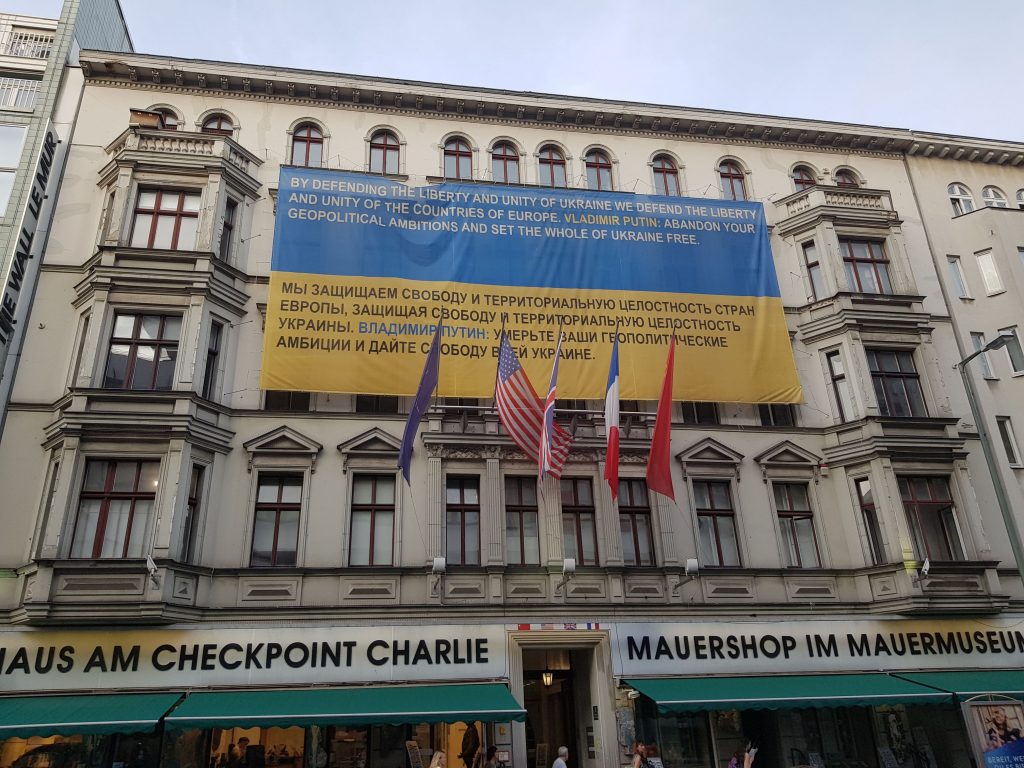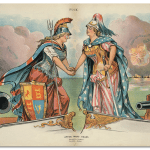
September 30, 2022 marked the abrupt end to a long era of world history. In a dark, threatening, and bombastic speech to his cowering, hand-picked apparatchiks, Russian President Vladimir Putin announced that his country was annexing almost one-fifth of Ukrainian territory – the eastern provinces of Donetsk, Luhansk, Zaporizhzhia, and Kherson. Russian soldiers staged referenda at gun-point in these invaded territories, forcing residents to cast ballots for a Russian Anschluss. No one believes the people of Eastern Ukraine want this outcome, but that does not matter for Putin. He claims Russia must take this territory from a sovereign state to protect his country’s culture and manhood.
Putin’s words and actions echo a distant past. The political scientist Tanisha Fazal has observed that between the French Revolution and the Second World War, large countries frequently conquered small ones – about once every three years, on average. The nineteenth and early twentieth centuries were eras of imperial consolidation across the globe, when powerful, industrial states took control of people and resources in near and distant territories. As Paul Kennedy and others have written, imperialism was the currency of great power politics. Military technology favored large, well-organized armies. Resource extraction and factory production concentrated power in a few states. And the expanding regimes asserted a civilizing mission to dominate others – a claim widely accepted at the time, at least among those educated at major universities.

The Second World War, triggered by the brutal, breakneck expansion of two empires in particular, Germany and Japan, weakened most of the conquerors. Years of economic deprivation and genocidal violence left little for holding distant territories. This was an imperial civil war that devasted the imperialists who made it. In its wake, formerly conquered peoples in Europe, Asia, and Africa gained new leverage to push for self-rule; their former conquerors had proven they were neither omnipotent nor civilized. Nationalist claims to territorial sovereignty for ethnic, religious, and linguistic groups replaced defenses of empire as the lingua franca of international relations. Adom Getachew calls this the “worldmaking” of an emergent anti-colonial era.
The United Nations, founded in 1945, embodied this geopolitical shift most clearly. From its first meetings, it existed to empower newly independent states, giving them voice, legitimacy, and often assistance in their efforts to secure their independence. The United Nations had severe limitations in its ability to curb abuses by states at home and abroad, but it re-mapped a former world of empires as a global community of sovereign territories. Above all, the international organization existed to reject conquest.
In this mission, the United Nations succeeded brilliantly. Although wars between and within states continued – and in some regions they multiplied in their frequency and damage – large countries felt constrained against conquering neighbors and former colonies. Fazal explains that after the Second World War new states were “born” at a rapid pace, and very few “died” over the next seven decades. Big powers continued to manipulate, bully, and coerce small states, but they paid consistent deference to their right to exist. The former empires relied on “indirect” forms of influence; they no longer argued they had a right to rule other peoples.
This development was significant because it placed constraints on how power could be used in foreign and military policy. A world organized against conquest deterred countries, including the United States, from acting in that way. A consensus arose that a norm of non-conquest benefited everyone – small states and big, powerful societies. Both superpowers promoted this norm, despite their other forms of aggression during the Cold War. Fearful of a war in disputed territories escalating into nuclear conflict, leaders in Washington and Moscow came to the conclusion that they had to avoid aggressive conquest. They fought many “limited wars,” as they called them – from Korea and Hungary, to Vietnam and Angola – but they almost always avoided annexation of sovereign territories. They used the cover of sovereign local leaders to show they did not seek another world war.
Historian Arne Westad has shown that these Cold War interventions were not necessarily less harmful than wars of conquest, but they were different. Each superpower had to make an effort to build an independent government in the site of intervention, and the intervening forces had to legitimize different local practices and cultures from their own. Each superpower also had to make promises about leaving, at least militarily. “Limited wars” were supposed to be limited in time; they could not be permanent, as acts of conquest claimed to be. These constraints on war promoted basic state sovereignty around the globe, making independent countries the expectation on all continents. Their numbers grew consistently from decade-to-decade, until now.

Putin’s effort to conquer territory in Ukraine is a bold and intentional effort to reverse seventy years of history. The Russian president calls this history “Western colonialism,” when it is really the opposite. The ruler of a former empire (the Soviet Union) that has been disintegrating since 1991 into independent states, he fears that Russian power will continue to diminish unless he conquers nearby territories. Annexing Ukraine to Russia, as he intends, promises to make his regime a central actor again in the middle of Europe. He will use conquest to increase his country’s reach, as his nineteenth century predecessors did before.
Putin is unlikely to succeed because of courageous Ukrainian resistance, strong world opposition, and the excesses of his ambitions. Conquest is very hard under any circumstances, and it rarely pays when the population resists so strongly. What is discouraging, however, is that Putin is likely not alone in pursuing conquest today. The language of military control and racial superiority is echoed by many other authoritarians, including Donald Trump, and it has enthusiastic support from citizens fearful of losing influence to more diverse cultures at home and abroad. If this is the end of the seven-decade era against conquest, we must work to insure it does not become a renewed era of empire and intolerance.
Jeremi Suri holds the Mack Brown Distinguished Chair for Leadership in Global Affairs at the University of Texas at Austin, where he is a professor in the History Department and the LBJ School. He is the author and editor of eleven books, most recently, Civil War By Other Means: America’s Long and Unfinished Fight for Democracy. He is the co-host of the podcast “This is Democracy.”
The views and opinions expressed in this article or video are those of the individual author(s) or presenter(s) and do not necessarily reflect the policy or views of the editors at Not Even Past, the UT Department of History, the University of Texas at Austin, or the UT System Board of Regents. Not Even Past is an online public history magazine rather than a peer-reviewed academic journal. While we make efforts to ensure that factual information in articles was obtained from reliable sources, Not Even Past is not responsible for any errors or omissions.
The image of Vladimir Putin used in this article’s banner image was obtained from Wikimedia Commons and originally published on the official website of the Russian presidency. Not Even Past has modified the photo’s background.



